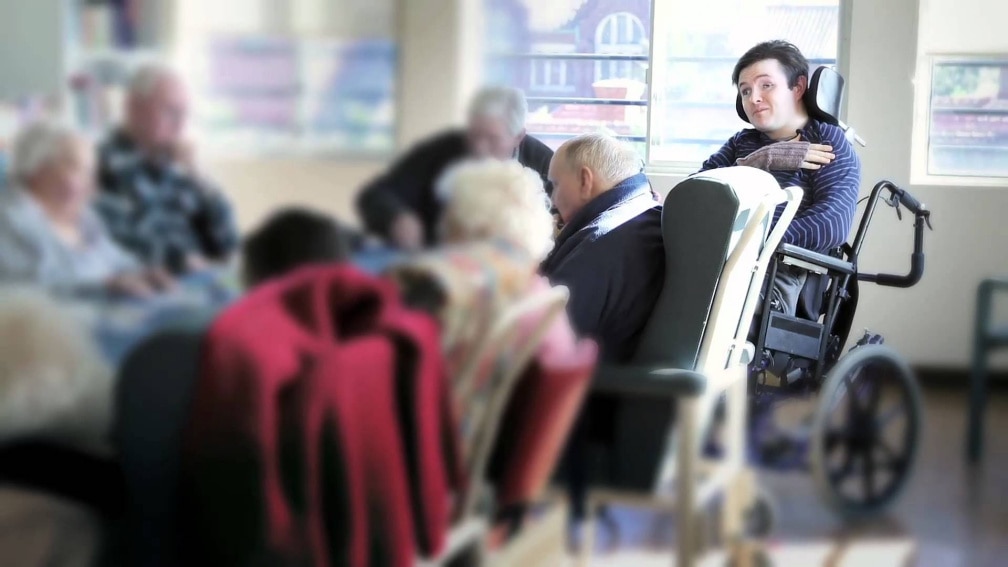
KJIPUKTUK (Halifax) – Imagine being 28-years-old and not being able to decide what you are going to eat for dinner—or breakfast or lunch.
Imagine not being able to take a bath when you need to.
Imagine having to ask someone if you can go to the toilet.
Imagine having to live with people who scare or threaten you.
Imagine living down a hallway from someone who sexually assaulted you, and you are told not to make a fuss.
All this can and does happen to people with severe physical disabilities who must live in nursing homes in Nova Scotia.
Nova Scotia does not normally provide access to small options homes (or group homes) for people with severe physical disabilities. Indeed, of the more than 200 small options or group homes across the province, few if any serve this group. Instead, the homes tend to cater to people labelled as living with intellectual disabilities or mental health conditions. People with severe physical disabilities have been all but shut out of the conversation.
Nursing homes are usually the only homes available for many with severe physical disabilities. To put this in perspective, people barely out of their teens are often housed with people usually more than 50 years their senior who live with dementia, psycho-social illnesses, or mental illness, or age-related disabilities.
A recent report, Situation Critical, authored by the Ontario Health Coalition warns of the dangers that beset many residents of nursing homes – due to staff shortages and lack of supervision of residents. The report found that the homicide rate in long-term care was higher than the murder rate in the largest Canadian cities, higher than virtually anywhere in our society.
Without enough staff there is no one to monitor aggressive residents, and little to prevent violent outbursts from residents, pushing or hitting other residents or staff. The report argues that low staffing levels are a policy choice, not a necessity. It also notes that with low staffing levels there is no time for bathing or repositioning residents to prevent bedsores.
These conditions also exist in Nova Scotia nursing homes. For example, last March Chrissy Dunnington, aged 40, died of an infection caused by untreated bedsores. The staff at her Halifax nursing home did not notice or treat the bedsores in time to prevent what became a septic infection. While Dunnington did have a severe physical disability, spina bifida, her condition was not, in and of itself, a death sentence. However, she had deteriorated during the two years she lived in the nursing home. Before that, she had lived in a family-type home.
The fact that she was quite young, and previously well looked after — then died in nursing home care tells us all what can happen to anyone confined to a nursing home.
The Nova Scotia government appointed an expert panel to look into care in nursing homes. The panel’s recent report called for more staff and reinstating bursaries to attract people to qualify as continuing care assistants. However the province has been slow to adopt some of the panel’s recommendations.
Few people under age 60 choose to live in a nursing home.
But there is little choice for people with severe physical disabilities. They can live with parents who, as they age, may not have the strength or stamina to continue to look after their now adult children. There is some financial assistance from the province to help pay for care in the parents’ home or in the disabled person’s own home, but that does not pay for 24 hour a day care, which many with severe disabilities require. Now the only realistic option for people with severe disabilities is to live in a nursing home.
Article 19 of the UN Convention on the Rights of Persons with Disabilities recognises that people with disabilities have the right to live in the community, to choose their residence, and choose with whom to live. The convention also states community services and facilities must be available on an equal basis to persons with disabilities. Canada is a signatory to the Convention.
When will the McNeil government ensure that people with severe physical disabilities have access to community-based group home settings?
Judy Haiven is a writer and social activist.
There will be a public panel discussion on the urgent need for housing and supports for people with severe physical disabilities on Thursday February 28, at 7 PM, at the Central Library on Spring Garden Road.
With a special thanks to our generous donors who make publication of the Nova Scotia Advocate possible.
Subscribe to the Nova Scotia Advocate weekly digest and never miss an article again. It’s free!




If he would just increase hours to long term care then all clients living in these facilities would benefit !
I am terrified to put my husband in a nursing home. I need hip surgery but I am afraid to have it because I feel he will not be well cared for in LTC.
How ironic that the whole point of putting someone in a nursing home is because they require 24 hour care, yet when they are put in one of these hell holes, they don’t receiver anywhere near 24 hour care. The “death by bedsore” incidents prove that. No one being properly looked after 24 hours a day would get a bedsore in the first pleace, never mind die from it.
So we have places to put seniors but not wheelchair users and others with severe physical problems. We still value the lives of our elders (despite not doing a very good job of caring for them) but the complete lack of facilities for those with physical disabilities proves no value is placed on that segment of the population at all. We are not valued when we are living on our own and when we can no longer do that, we are quickly dispensed with.
“her condition was not, in and of itself, a death sentence.” However, being in a nursing home with severe physical disabilities is a death sentence. When my condition deteriorates to the point that I can no longer stay independent in my own apartment and I am told I have to be put in a nursing home, my life is over at that point. There won’t be any “death by nursing home” aka bed sores and all manner of neglect and abuse, in my future. It’s a fate worse than death.
I was just told the other day in a telephone interview that the LTC Home system here in Nova Scotia is near perfect compared to Ontario and their system for reporting abuse works. I told them I beg to differ.
Moved back here about a year ago from Ontario in hopes of working with the government to better the LTC system for individuals living with Dementia. Both of my parents have passed from 2 different types of Dementia, my mom in 1989 from Early On-Set Alzheimer’s at the age of 55 and my dad in 2015 from Multi-Infarct Vascular Dementia. I was a primary caregiver in both cases and my father’s LTC Home helped create the Behavioual Guidelines of Ontario (similar to NS Challenging Behaviour Unit). In 2012, I left my previous career and became a PSW so I’m well aware of what goes in the LTC Homes and it’s the same across this nation (some provinces just pay their frontline staff members more to put up with the bull). I have furthered educated myself in different aspects of Dementia including the Dementia Villages and the Montessori Dementia Program created by Dr. Cameron Camp and is used world-wide.
Basically, after a year of trying Randy Delorey had two individuals from the DHW call me for an interview about a program I have created to help better the system. I was informed during this interview that the NS government does not indulge in buying these programs and they only called me at the request of the Health Minister. Mind you they took 4 weeks and some rescheduling to tell me this. Obviously though the one email I sent to Mr. Delorey sparked enough interest because he did make someone finally call me.
During the interview they casted a statement saying I’m a PSW from Ontario and this is when they began about how perfect the system really is. First, I have more education that just that in this field. Two, I was a manager, trainer and business owner in my other career. Three, I am not blind to what is really going on in the LTC Homes and recognize why it keeps happening.
The government, regardless of province, should pay more attention to what frontline staff members (CCA’s, PSW’s, etc) are saying because they know the truth about what’s really going on behind closed doors. As a frontline staff member myself at one point, I do not tolerate anyone who does not do what’s right regardless of the situation because residents lives matter. However, I also know the LTC Homes would be a better place if Administrators and the government would get off their high horses and take their blinders off so they can really better the situation.
I am for many of the basic solutions they have suggested here (higher wages, a new added position) because they do have this in Ontario and British Columbia, but I also know this is still not enough. I keep fighting to get heard, but I’m starting to feel like the only way this is going to happen is to do an undercover piece on the LTC Homes here. Since being here I have surveyed many different things and as I stated earlier the same problems exist here as they do across our nation. One question I have asked over 20 different LTC Home administrative staff members is “Have you read the 35 page NS Dementia Startegy?” and each time their answer was know. Well I may not have lived here all my life, but I have read the strategy. Also, my dad is born and bred here in NS and I have spent a great deal of time here throughout my life. Plus, how do they know what the government expects of them if they don’t read it? So all I might be in the eyes of the government is a frontline staff member (the least educated, in their minds not mine), but I’ve already one-upped those twenty plus homes. Never judge a book by its’ cover! Some of us were getting hands-on experience which is better than theoretical experience.
All I want to do is better the system and if I can, yes I would like to do it nationally because every Canadian deserves quality of life after giving this country so much of theirs’.